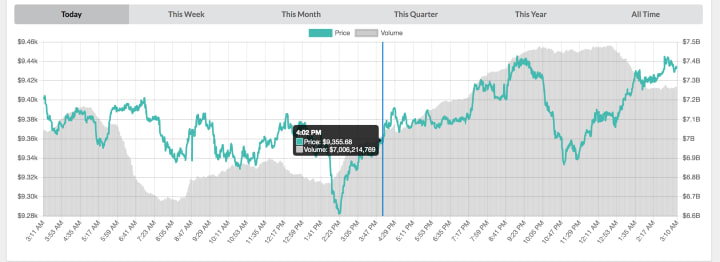The Ultimate Guide for Investing in Cryptocurrency for Beginners
Getting involved in cryptocurrency can seem overwhelming, but investing some time in reviewing the ultimate guide for investing in cryptocurrency for beginners can pay off.

Are you ready to stop sitting on the sidelines and jump headfirst into the cryptocurrency arena? Doubling, tripling, and in some cases, enjoying over 1,000x increase in value is not unheard for smart investments. Knowing the bitcoin influencers to follow, all of the cryptocurrency slang, and bitcoin alternatives can only increase your chances of scoring big in the crypto world. But before embarking on the journey that is cryptocurrency, you'll have to learn about all there is to know about investing in cryptocurrency for beginners.
Why Cryptocurrency?
Cryptocurrency is a term encompassing digital currencies. There are hundreds, each with unique technological specifications and not all are created equally.
Think of your investments as bets on the future of computation abilities. Imagine if you could own a piece of Google before it was a functioning search engine. Cryptocurrencies are the infrastructure for the next generation of global communication. The internet was the first protocol to connect the world and now, the crypto-sphere is building the foundation for a more interconnected, faster, and decentralized future.
Understanding the Market

Source: livecoinwatch.com
One of the first things to know about investing in cryptocurrency for beginners is how to understand the market. Much like the stock market, each cryptocurrency has its own acronym, complete with a price history. A great resource to start analyzing the market is LiveCoinWatch, where you can visualize the price history of every currency being traded. The above image shows Bitcoin's volume and price over a 24-hour period.
Supply: Unlike fiat currency, most crypto coins have a finite supply. Deflationary currencies will inherently rise in value as their demand increases. The economy behind crypto encourages saving instead of spending, quite the opposite of the US dollar.
- The circulating supply refers to the number of coins being traded.
- The total supply refers to the number of coins in existence.
- The max supply is the final number of coins that will be created. Many currencies are still being mined and not all have been created yet.
Market Cap: Short for Market Capitalization, it’s a simple formula used to put a specific value on a coin. The formula is Price x Circulating Supply.
The entire cryptocurrency market has its own market cap, the larger the number, the more valuable each token tends to be. When investing in specific tokens, study their individual market cap to measure the potential for growth. Compare tokens to more established ones, such as Bitcoin, to judge how well they are performing.
Volume: This refers to the value of tokens being traded. Higher volume generally increases the price, lower volume will reduce prices. Good investments seek out lesser known coins with high trade volume, it could be a precursor for a jump in value.
What is a wallet?
The term wallet refers to a program used to store cryptocurrencies and is one of the most important terms when investing in cryptocurrency for beginners. When you buy and hold cryptocurrency, you are your own bank, there are no middlemen. When you invest in cryptocurrencies you will need a wallet to control your assets. There are several different types of hardware wallets:
Online Wallet: All online exchanges will give you a wallet when you create an account. Stored on 3rd party servers, sometimes referred to as “cloud storage,” this type is useful for making short-term trades. However, you do not control your assets, the company hosting the server does. There are plenty of examples of exchanges being hacked and people losing all their assets. Keep the majority of your coins off 3rd party servers and on more secure wallets.
Desktop Wallet: The best option for investing in cryptocurrency for beginners, this type of wallet is simple to use and secure. Be careful when setting them up, you will create a passcode and a 12-word passphrase, WRITE IT DOWN. If you forget your passwords, there is no way to access your coins—that’s how secure these wallets are. We recommend writing down everything on paper, this prevents nefarious parties from accessing your hardware remotely and stealing from you. Though there are many desktop wallets, there are some that are more trustworthy than others:
- Exodus: Easy to use, stunning visuals, and a strong development team makes this a great choice. You will have higher fees than other wallets when transferring assets but that’s the price paid for good UI.
- Electrum: Open source with plenty of updates to block malicious attacks. A more cost-effective option, it does lack user-friendly controls.
Cold Storage: The most secure method for storing crypto-assets. Resembling USB drives, you can move your coins onto the SSD and never connect to the internet, providing long-term protection and peace of mind. The passcodes and phrases associated with your device make it practically unhackable, DON’T LOSE THEM. Trustworthy cold storage options include:
- Trezor Wallet: With an easy to use interface, this is a good choice for security aficionados.
- Ledger Nano: Not much of a difference between Trezor other than UI and design. Another robust option for your storage needs.
Alternative Buying Options
Cash: If privacy, anonymity, and the security of untraceable purchasing is important to you, the best option is to use cash. There are risks involved, absolutely no oversight exists and when meeting a stranger to exchange a large amount of cash, use your common sense. There are ways to do wire transfers and websites exist to facilitate such transactions.
- LocalBitcoins: The most trusted website in the industry for cash transactions, users are ranked based on peer reviews, like eBay. Find a good review and either meet in person or perform a bank/wire transfer. Prices are generally inflated with such exchanges but that’s the price you pay for privacy.
Credit Card/Bank Account: The most popular and some would say the safer method of buying crypto is to use an online exchange. Your identity must be verified using a government ID and your credit cards and bank accounts will be traceable by financial institutions and the IRS. Some restrictions apply depending on which country you live in.
- Coinbase: The easiest and most popular exchange to use, if you’re just starting, we highly recommend you set up a Coinbase account right now. You are limited to $200 trades using a credit card but connecting a bank account will increase your limits tremendously. There are exchange fees in both the purchasing of currencies and transfers off the Coinbase wallet.
- GDAX: After creating a Coinbase account, you will have access to GDAX—they are the same company. This website has a small learning curve but will allow you to make trades without relying on an expensive middleman. Perform limit orders and manipulate the prices to your liking.
Both GDAX and Coinbase are extremely limited in which currencies you can buy. The four available are Bitcoin Cash, Litecoin, Bitcoin, and Ethereum.
Buying Altcoins
After successfully trading your fiat into Bitcoin or similar coin, you can now trade on other exchanges for altcoins. The term "altcoin" refers to cryptocurrencies that are not Bitcoin. Most exchanges only accept Bitcoin and you will need to transfer your Bitcoin onto their online wallet. Altcoin exchanges include:
- Bittrex: Easy to use, most altcoins will be available.
- Binance: A favorite for many traders, there is a waiting list to sign up.
- Shapeshift.io: Completely anonymous, it only allows you to perform market trades.
Final Takeaway
When you are investing in cryptocurrency for beginners, there are many things to take into consideration. Start small, and only invest money you can afford to lose. Watch your selected coins for a few weeks, or even months before diving in. Understand how the market is working and look for low prices before investing. Invest in the more popular tokens first, such as Bitcoin. After you understand the basics, start moving into altcoins and even ICOs. There is a huge world of information and this is only the tip of the iceberg. Crypto is the future of finance and it is a good idea to get in while you still can.
About the Creator
Joshua Samuel Zook
Grew up in a religious household. Listened to countless sermons on the wrath of God. An epiphany struck him and he realized no one is that angry, not even God.






Comments
There are no comments for this story
Be the first to respond and start the conversation.